AI Virtual Assistant in Healthcare Case Study: 5 Powerful Insights Revealed
04 Jul 2025 By: Vlade Legaspi
Updated

An AI virtual assistant in healthcare case study shows how smart software uses natural language processing to manage routine medical tasks. These systems improve efficiency by automatically scheduling appointments, answering common questions, and supporting clinical decisions. For example, a hospital might use a virtual assistant to handle patient inquiries 24/7, reducing staff workload. This ensures patients receive immediate support while allowing providers to focus entirely on direct treatment.
As someone who has managed clinical workflows, I’ve seen how quickly a front desk can become overwhelmed by basic questions. Moving those routine tasks to an automated system truly changed how our team functioned. In this article, I will explain the specific findings of the AI virtual assistant in healthcare case study and walk you through how these tools can be integrated into your own practice to improve care.
AI Virtual Assistant in Healthcare Case Study: Understanding AI Virtual Assistants
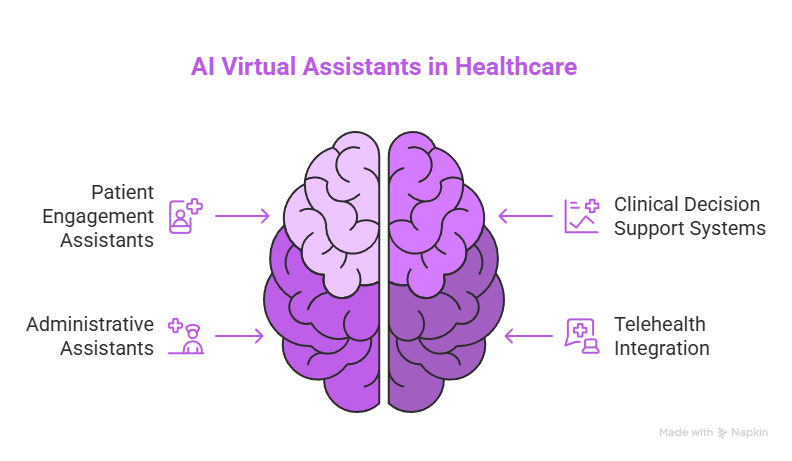
AI virtual assistants are software applications created to provide assistance with tasks or services for people or companies by using natural language processing (NLP) and machine learning. The healthcare industry employs these systems to provide support to patients during appointment management as well as supply medical information and help clinical practitioners with their decision-making processes.
What is the Technology Behind AI Virtual Assistants?
The fundamental elements of AI virtual assistants depend on their advanced algorithmic processes and their data processing abilities. Tools like text to speech software further enhance these systems by enabling audio-based communication, which is particularly helpful for visually impaired patients or in hands-free medical environments. To further enhance accessibility and hands-free patient communication, many healthcare teams complement AI virtual assistants with text-to-speech solutions like Speechingly, which convert critical health information into clear, natural-sounding audio for patients and staff. These systems gain their ability to understand human language and provide responses through natural language processing functionality. Machine learning allows virtual assistants to grow in capability through past interaction analysis which enhances their performance in successive use.
The integration of virtual assistants with electronic health records (EHR) systems and healthcare database access allows them to obtain patient information so they deliver precise relevant responses. These united technological systems have developed into an efficient instrument which benefits both medical staff and patients. The advancement of AI technology continues to improve virtual assistants which now manage complex inquiries while delivering individualized patient care.
What are the Types of AI Virtual Assistants in Healthcare?
The different healthcare AI virtual assistant applications are categorized according to their operational capabilities. The main types of AI virtual assistants include:
- Patient Engagement Assistants enable patient-to-system interaction for query response and appointment booking and medication alert delivery.
- The system provides healthcare providers with an analytical tool that examines patient information while generating treatment recommendations through established clinical standards.
- The administrative assistants work to optimize administrative procedures through their management of billing operations alongside insurance claims processing and scheduling appointments.
Each type functions independently to optimize healthcare delivery operations. Patient engagement assistants help improve patient satisfaction through their immediate response capability which shortens waiting times and enhances patient experience. Clinical decision support systems assist healthcare professionals with diagnosing patients while also helping them detect possible drug interactions which enhances patient safety. Healthcare staff receive assistance through automated routine tasks from administrative assistants which enables them to dedicate more time to patient care instead of paperwork.
AI virtual assistants now play a more extensive role than traditional healthcare facilities. AI virtual assistants are now part of telehealth platforms which enable remote consultations and follow-ups thereby improving healthcare accessibility for patients living in rural or underserved regions. The advancement of these technologies will bring new applications which will improve healthcare delivery systems while enhancing patient outcomes.
AI Virtual Assistant in Healthcare Case Study: Implementation of an AI Virtual Assistant
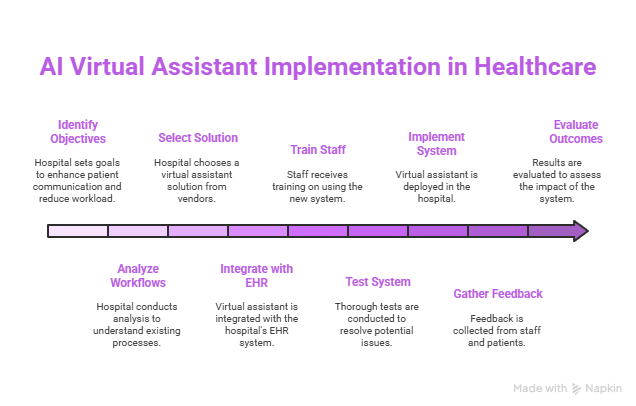
This research uses a mid-sized hospital’s virtual assistant system implementation to demonstrate healthcare AI virtual assistant benefits. The healthcare facility implemented this system to boost patient interaction and decrease administrative work.
Objectives of Implementation
The main purpose behind deploying an AI virtual assistant was to:
- Enhancing patient communication and engagement.
- Reducing the workload on administrative staff.
- Improving appointment scheduling efficiency.
- The system offered patients immediate access to their health information along with details about available treatment alternatives.
The hospital required these targets to resolve their major issues regarding rising patient numbers and insufficient personnel. The hospital aimed to create a better patient environment through these goals because such an environment leads to enhanced health outcomes and supports their workforce relief efforts.
Process of Implementation
Several important steps were required to execute this implementation process.
- 1.) The hospital conducted an extensive analysis to understand existing workflows before determining how an AI virtual assistant would create value.
- 2.) The hospital picked a solution from multiple vendors which matched their requirements and financial resources.
- 3.) The virtual assistant operated within the existing EHR system of the hospital which provided unbroken access to patient data.
- 4.) Staff received training to learn the new system while the organization ran thorough tests to resolve potential issues before the system went live.
The hospital achieved its goals through a structured approach which led to successful system implementation. The hospital set up a feedback process which enabled staff members and patients to report their experiences about using the virtual assistant. Ongoing evaluation proved essential for hospital staff to enhance the assistant’s functionality while supporting hospital needs and patient requirements.
Outcomes and Results
The AI virtual assistant implementation at the hospital produced multiple positive results after deployment.
- The virtual assistant delivered better patient communication which led to higher satisfaction rates among patients.
- The implementation of the AI assistant decreased staff workload by reducing scheduling needs and basic question responses so they could concentrate on vital responsibilities.
- The AI assistant optimized appointment scheduling which resulted in reduced patient no-shows and increased clinic operational performance.
The healthcare delivery transformation was demonstrated through these results because AI virtual assistants achieved improved efficiency and patient-focused care. The virtual assistant at the hospital provided individual patient-specific reminders and educational resources that resulted in improved treatment plan adherence among patients. The implementation of technology enabled better clinical outcomes through proactive healthcare approaches because patients gained health control and experienced improved results.
What are the Benefits of AI Virtual Assistants in Healthcare?
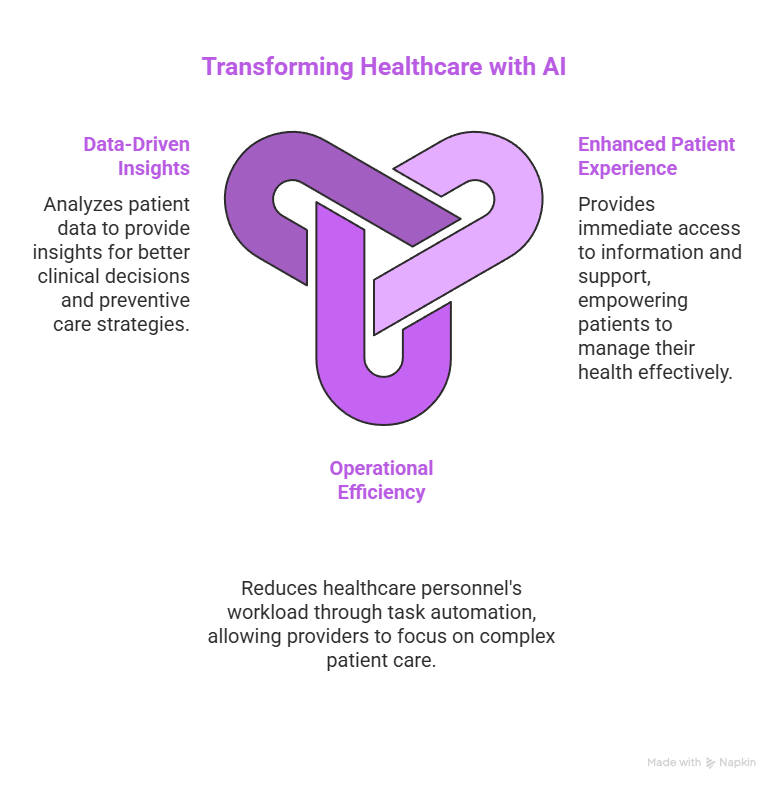
AI virtual assistants in healthcare deliver multiple advantages which create better outcomes for patients and providers. The main advantages of AI virtual assistants include:
Enhanced Patient Experience
AI virtual assistants provide patients with immediate access to information and support. AI assistants function as always-available resources that provide immediate responses about symptoms and medication information and appointment details to patients. The accessible nature of these services enables patients to feel empowered about their health because they can better control their wellness.
Operational Efficiency
The implementation of AI virtual assistants through task automation decreases healthcare personnel’s workload. The operational efficiency improves when providers dedicate their time to complex patient care tasks. The elimination of administrative work enhances both employee morale and results in better patient treatment.
Data-Driven Insights
AI virtual assistants analyze extensive patient data to deliver important information to healthcare providers. The obtained insights enable better clinical choices and allow healthcare providers to detect patient health patterns for improved preventive care strategies. Healthcare organizations that use data make better decisions which leads to improved patient care outcomes.
What are the Challenges and Considerations on AI Implementation?
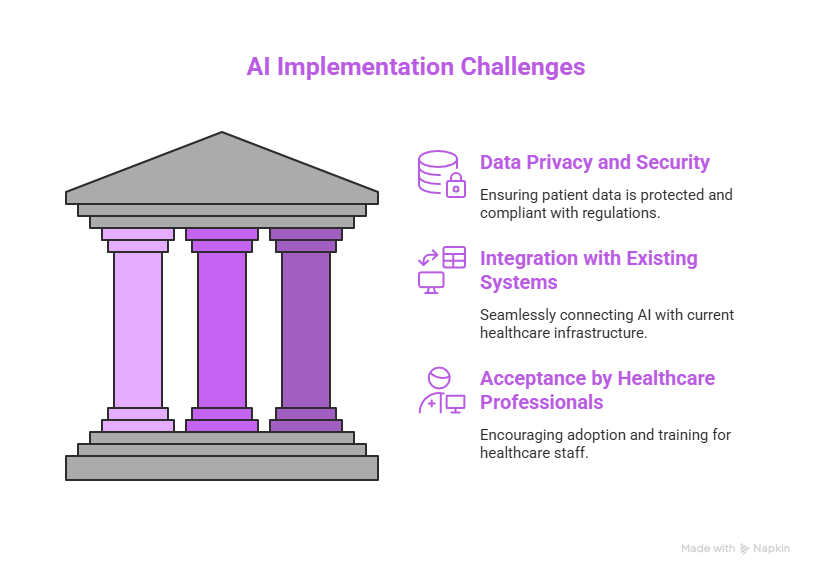
AI virtual assistants in healthcare bring many benefits yet their implementation faces various challenges. Organizations need to handle specific matters for successful implementation of AI virtual assistants.
Data Privacy and Security
The privacy issues attached to patient data and the resulting concerns are the greatest challenge confronting AI healthcare applications. Health care providers must ensure that patient data is protected by preventing any unauthorized access. Health care providers also have to make sure that their AI doctors are HIPAA compliant and invest in thorough security in order to keep patient data confidential.
Integration with Existing Systems
The process of combining AI virtual assistants with healthcare systems proves to be quite complicated. The virtual assistant needs to link properly with EHRs and databases for delivering accurate real-time information to users. IT teams need proper planning together with healthcare organizations to solve integration problems effectively.
Acceptance by Healthcare Professionals
The success of AI virtual assistants depends on healthcare professionals adopting and implementing these tools. The refusal to change acts as a barrier which prevents AI solutions from achieving successful implementation. The adoption of AI virtual assistants among staff members becomes more likely after receiving proper training and showing the advantages of these tools.
The Future of AI Virtual Assistants in Healthcare
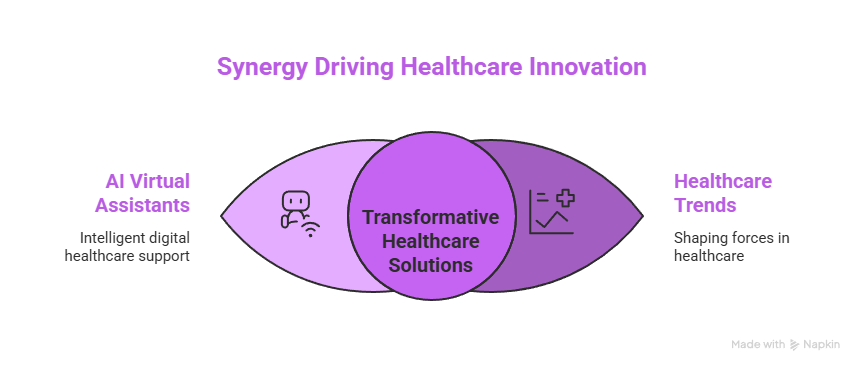
AI virtual assistants in healthcare appear to have a bright future ahead. These digital assistants will advance in capabilities due to technological growth. Several key trends will shape the development of AI virtual assistants.
Increased Personalization
Future AI virtual assistants will use complex algorithms to generate personalized healthcare recommendations from individual patient health records. The level of personalization through AI will boost patient involvement while resulting in better health results.
Integration with Wearable Technology
AI virtual assistants will merge with wearable technology devices to track patient health data in real time as these devices gain widespread use. Real-time health management improves through this integration which enables proactive care along with timely interventions.
Expansion into Telehealth
Telehealth expansion has introduced fresh opportunities for AI virtual assistants to operate in the healthcare industry. AI virtual assistants help healthcare professionals deliver virtual consultations while performing patient triage and generating post-treatment instructions. The expansion of healthcare services through AI virtual assistants will improve service accessibility and operational efficiency.
TRENDING NOW!
The role of AI virtual assistant tools in healthcare are changing the patient-provider interaction for the better. These helpers take over the routine work of the administration such as making appointments, monitoring patient information, and replying to common questions, which, in turn, leads to shorter wait times and greater productivity. Their natural language processing capability helps them in giving instant replies, making communication easier, and offering support in decision making. Consequently, healthcare professionals see a reduction in costs, patient satisfaction increases, and service is delivered faster.
Various case studies highlight the impact of AI virtual assistants in such diverse functions as medication reminders, finding services, and disseminating health information. Besides, they contribute to the engagement of patients, the quality of care, and the adherence to data management rules. There are platforms like Keragon that connect with EHRs, billing automation, and customer service in multiple languages, leading to a more inclusive and large-scale healthcare. With the advancement of technology, the virtual assistants are going to be an important factor in the process of updating patient care and medical work flow.
For healthcare practices looking to combine AI insights with real human support, you can get a medical virtual assistant to manage administrative and patient-facing tasks, ensuring smoother operations without adding pressure to your staff.
Conclusion
AI virtual assistants transform healthcare systems because they bring advantages to healthcare providers as well as their patients. The digital tools are the mainstays in providing health services as they are able to engage patients better and at the same time utilize the data insights to streamline their operation. To be able to reap the benefits of AI virtual assistants, the organizations have to deal with privacy issues related to data, be able to integrate their systems and have their staff accept the idea.
The future of AI in healthcare appears promising because technological progress continues to advance. The expanding influence of AI virtual assistants will transform patient care because they will deliver personalized treatment while connecting with wearable devices and expanding telehealth capabilities. The adoption of these technological advancements stands as a crucial factor to enhance healthcare results while delivering optimal patient care.
HelpSquad health is ready to help. Our trained virtual assistants and 24/7 support team handle healthcare tasks with ease. With bilingual agents from $9/hr. you get expert help without high costs. Start your trial now and see the HelpSquad difference!
What is an AI virtual assistant in healthcare?
An AI virtual assistant in healthcare is software that uses natural language processing (NLP) and machine learning to help patients and care teams with tasks like answering questions, managing appointments, sharing medical information, and supporting clinical and administrative workflows.
How do AI virtual assistant tools actually work (NLP, machine learning, and data access)?
They combine NLP to understand and respond to human language, machine learning to improve from past interactions, and integrations (like EHR access) to deliver more accurate, patient-specific responses when appropriate.
What did the case study hospital aim to achieve by implementing an AI virtual assistant?
The goals were to improve patient communication and engagement, reduce administrative workload, and make appointment scheduling more efficient, especially as patient volume increased and staffing was limited.
What implementation steps mattered most in the case study?
Key steps included analyzing existing workflows, selecting a vendor that fit needs and budget, integrating the assistant with the hospital’s EHR for continuous access to patient data, and training/testing before launch, plus collecting ongoing feedback from staff and patients.
What results did the hospital see after deploying the AI virtual assistant?
The case study reported improved patient communication and satisfaction, reduced administrative burden (especially for scheduling and basic questions), and more efficient scheduling with fewer no-shows, helping staff focus on higher-value patient care.


